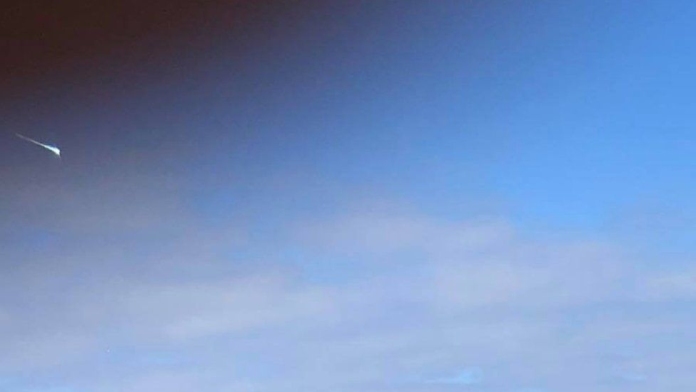An “extremely rare” meteor known as a daytime fireball has been identified as the likely cause of a sonic boom-type noise heard across the west of England, including the Burnham-On-Sea area, on Saturday (March 20th).
People in Dorset, Somerset, Devon and Jersey reported hearing a loud bang and seeing a streak of light in the sky on Saturday afternoon at 2.56pm.
The meteor was captured streaking across the Jersey skyline on Saturday afternoon by the O’Prey family, pictured above.
After analysing pictures and videos, experts confirmed they showed a meteor. They have urged people to keep an eye out and report any fallen fragments of the space rock.
Simon Proud, a specialist in aviation meteorology at the University of Oxford, captured the meteor – which appeared as a bright flash – flying over the UK on a weather satellite.
Ollie Peart, of Dorchester, managed to capture the noise on his security camera, featured below, and described it as a “massive bang”.
Massive bang over #Dorchester around 20 minutes ago. Any sound nerds know what it is? #Dorset. pic.twitter.com/tHnHEifhhF
— Ollie Peart (@Ollieep) March 20, 2021
A Burnham-On-Sea.com reader who was in Brent Knoll at the time, added: “It was a loud banging sound with a rumble that lasted several seconds.”
Police forces including Dorset, Devon and Cornwall and Avon and Somerset Police said they have had no incidents reported which related to the noise.
It was heard in Burnham, Taunton, Bridgwater and Wellington and further afield in Dorset and parts of Devon.
He added that the one seen on Saturday would have needed to be “very large” to be visible during day.
Dr Ashley King from the UK Fireball Alliance – a group of experts and enthusiasts who hunt for freshly-fallen meteorites – said the fireball “would have been going faster than the speed of sound”.
“Normally when you hear that it’s a good sign that you have got rocks that have made it to the surface. It’s incredibly exciting and I’m a bit stunned,” he said.
The group has asked people in the Devon, Dorset or Somerset areas to report finds of any fragments – believed to be small blackish stones, or a mound of dark dust.
Data from cameras is also being analysed to give details of the meteor’s journey.
Speaking to BBC Radio Somerset, astronomer and science journalist Will Gater, who was among the first to link the sonic boom to a meteor, said: “If somehow the location can be pieced together who knows – the thought that something could be recovered is quite exciting.”
Following the “huge bang”, which people said shook their homes and windows, an earthquake was ruled out by The British Geological Survey.
The Ministry of Defence also said the “massive bang” was not linked to any RAF aircraft.







